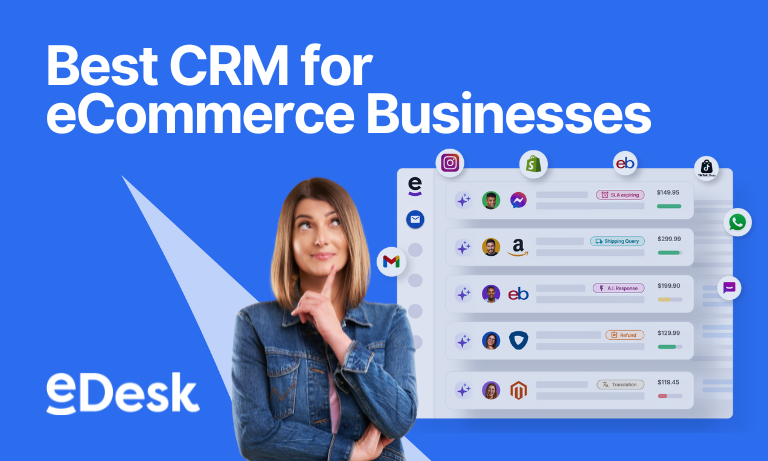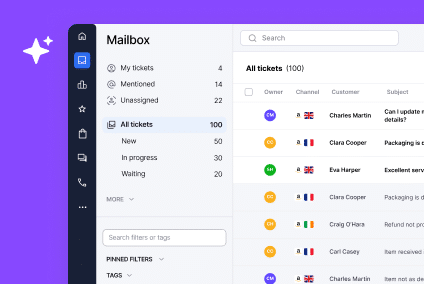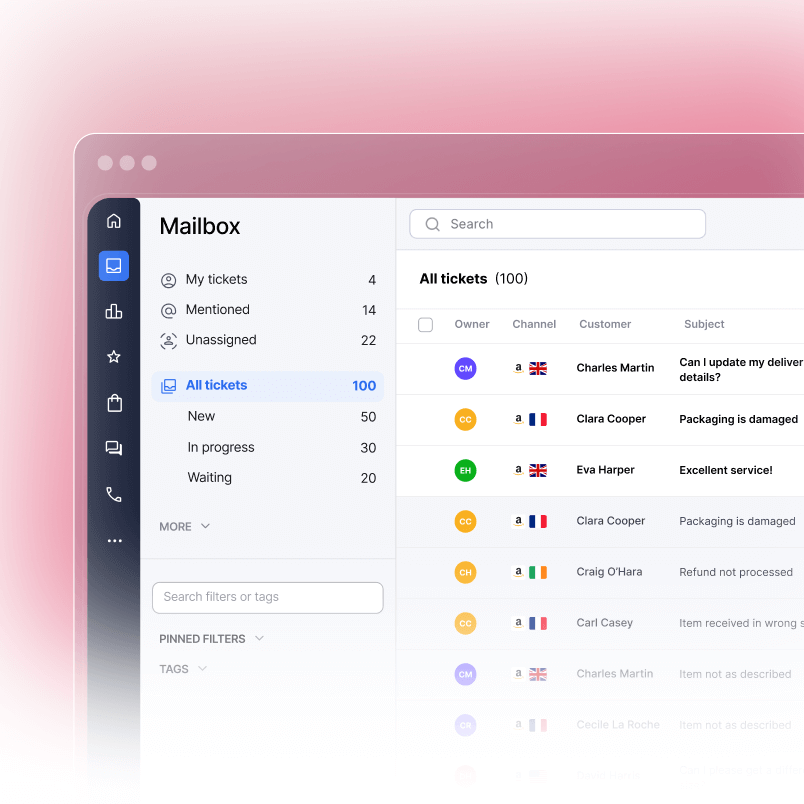Looking for the best CRM for eCommerce success in 2025? Whether you’re running a Shopify store, managing multiple sales channels, or scaling a niche brand, the right customer relationship management (CRM) system can transform your business.
But here’s the catch: most traditional CRMs aren’t built for online sellers.
In this guide, we’ll define what an eCommerce CRM really is, explore the features that matter, explain why integrations – especially with your helpdesk – are non-negotiable, and help you choose the right system for your store.
What is an eCommerce CRM?
An eCommerce CRM (customer relationship management system) is software designed to help online sellers manage customer data, personalize marketing, streamline sales automation, and improve support. Unlike generic CRMs, ecommerce CRM software integrates directly with your storefronts, marketplaces, and communication tools.
In short: it’s your control center for building better customer relationships at scale.
Why Traditional CRMs Fall Short for eCommerce
Many CRMs were built for B2B sales pipelines, not multichannel retail. If you’re an online seller, these gaps might sound familiar:
- No access to order data or tracking from marketplaces like Amazon or eBay
- Lack of native integrations with Shopify, BigCommerce, or WooCommerce
- No way to connect customer support with sales or marketing data
- Limited support for real-time inventory or fulfillment updates
- Poor tools for customer segmentation based on browsing or buying behavior
That’s why purpose-built CRMs – or deeply integrated ones – are essential for modern online stores.
Key Features of the Best CRM for eCommerce
If you’re choosing a CRM for your online store, prioritize these eCommerce-specific features:
✅ Shopify CRM integration and support for other major platforms (eBay, Amazon, Walmart, WooCommerce)
✅ Unified customer profiles pulling data from orders, emails, chats, and reviews
✅ Marketing automation tailored for cart abandonment, loyalty campaigns, and upsells
✅ Sales automation for eCommerce, not just B2B pipelines
✅ Customer segmentation by product interest, order history, region, and behavior
✅ Multichannel selling support with integrations for helpdesk, email, SMS, and more
✅ Real-time inventory and order sync
✅ Analytics and reporting for LTV, churn, repeat purchase rate, and more
eDesk + Your CRM = A Unified eCommerce Stack
While eDesk isn’t a CRM, it complements and enhances any eCommerce CRM by giving your support and sales teams a shared, actionable customer view.
Here’s how eDesk fills the gaps:
🔗 Two-way CRM sync – See customer messages, order history, and shipping status alongside CRM notes
📦 Native integrations with Amazon, eBay, Shopify, Walmart, and more
💬 AI-powered support with templates, tagging, and prioritization
📊 Customer data platform functionality with insights across channels
⚙️ Automations to reduce ticket volume and improve first-response time
💡 Pro tip: Integrating your CRM with eDesk unlocks smarter segmentation and more relevant marketing, while keeping support efficient and personalized.
Best CRMs for Small eCommerce Businesses (2025 Picks)
Here are some of the top eCommerce CRM systems to consider, especially for small to mid-sized sellers:
| CRM | Strengths | eDesk Integration |
| HubSpot (with eCommerce plugins) | Powerful automation, robust UI | ✅ via API |
| Klaviyo | Great for marketing automation and segmentation | ✅ via Shopify |
| Zoho CRM | Budget-friendly, customizable workflows | ✅ via Zapier |
| ActiveCampaign | Strong for email marketing and sales | ✅ via integration tools |
| Drip | Built for eCommerce brands | ✅ via Shopify |
| Salesforce Commerce Cloud | Enterprise-grade, scalable | ✅ via custom setup |
FAQs: Choosing the Right eCommerce CRM
Q: Can I use a CRM with Shopify?
A: Yes! Look for tools with Shopify CRM integration, like Klaviyo, Drip, and Zoho. eDesk also integrates with Shopify to sync customer orders and support tickets.
Q: What’s the best CRM for small eCommerce businesses?
A: Klaviyo and Zoho are excellent starting points due to ease of use and pricing. For lean teams, combining a lightweight CRM with eDesk provides a complete solution.
Q: Are there free CRM tools for eCommerce?
A: Yes. HubSpot’s free tier and Zoho’s basic plan offer enough for small stores. Just ensure they support the integrations you need.
Q: Do I need both a CRM and a helpdesk?
A: Ideally, yes. CRMs track long-term customer data and marketing journeys. Helpdesks like eDesk handle real-time communication, tickets, and support efficiency.
Choose a CRM That Grows with You
The best CRM for eCommerce is one that grows with your store, integrates seamlessly with your tools, and turns customer data into action. Don’t settle for a generic system.
Whether you’re a Shopify entrepreneur or managing a multichannel empire, make sure your CRM connects to your support stack – especially tools like eDesk that unify data and boost customer experience.
Ready to streamline your support and CRM workflows?
Book a demo with eDesk and see how it fits (perfectly) into your eCommerce tech stack.




